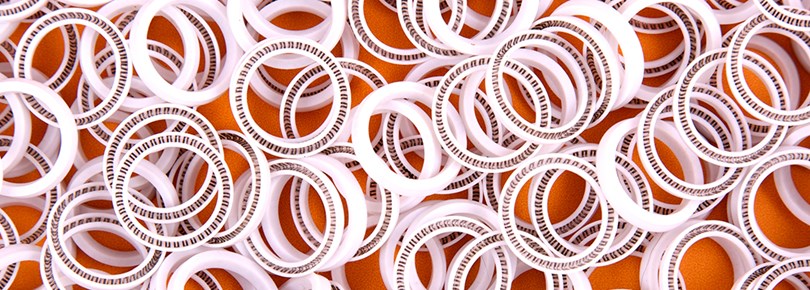Materials for energised seals and bearing strips
August 2020

Standard PTFE Materials
Fluorinoid® PTFE Compounds
Fluorocarbon’s Fluorinoid® PTFE materials are renowned for their chemical inertness to almost all known industrial chemicals and are suitable for continuous temperatures of up to 260ºC dependent on pressure. Limitations for use are restricted to the molten alkali materials, fluorine and strong fluorinating agents.
Our extensive resources enable us to offer unrivalled experience of PTFE materials technology when applied to sealing systems.
The table below details the recommended Fluorinoid® materials for energised seals and bearing strips.
| Code | Description | Properties/Applications |
| FL100 | Virgin PTFE | Almost a universal chemical resistance over a wide temperature range with unique low friction and anti-stiction properties. More prone to creep and abrasion than filled grades. Suitable for food applications. |
| FL114 | Carbon/Graphite filled PTFE | Good bearing material with excellent resistance to wear and creep. |
| FL115 | Carbon filled PTFE | Good bearing material with excellent resistance to wear and creep. |
| FL117 | Ekonol® filled PTFE | Polymer filler provides good physical properties which can be used with non-hardened running surfaces. |
| FL123 | Graphite filled PTFE | Good material for bearing applications with limited lubrication. |
| FL141 | Bronze filled PTFE | Standard bearing material with excellent resistance to wear and creep. |
| FL148 | Bronze filled PTFE | Standard material for oil hydraulics with excellent resistance to wear and creep. Chemical resistance is limited to that of the bronze filler. |
| FL151 | PTFE with special additives | General purpose low friction material with good resistance to abrasion and creep. |
| FL156 | Carbon filled PTFE | Good resistance to wear and creep under load. |
| FL158 | Glass/Molybdenum filled PTFE | This combination of fillers offers excellent physical properties with good resistance to creep and abrasion. Requires harder running surfaces to minimise wear. |
| FL159 | Glass filled PTFE | General grade of PTFE with glass fibre and other fillers. Offers excellent physical properties with good resistance to abrasion and creep. Requires running surfaces than other PTFE grades. |
Spring Energiser Material
For general use, spring energised seals are fitted with springs manufactured from stainless steel 301/302.
Other materials are available and their properties and applications are listed below.
| Description | Properties/Applications |
| Stainless steel 301/302 | General purpose application. Good corrosion resistance. 301 used for smaller springs. |
| Nickel-chromium alloy UNS N10276 (eg Hastleloy® C-276) | Excellent resistance to localised forms of attack by hot contaminated mineral acids, solvents, chlorine and chlorine contaminated acids. NACE approved. |
| Colbalt-nickel-chromium-molybdenum alloy UNS R30003 (eg Elgiloy®) | Excellent corrosion resistance alloy with high strength and good mechanical properties, even at elevated temperatures. Widely used in the oil and gas industry. NACE approved. |
| Nickel-chromium alloy UNS N07750 (eg Inconel® X750) | Excellent corrosion resistance. Widely used in petrochemical applications. NACE approved. |
| Double spring cobalt-nickel-chromium-molybdenum alloy UNS R300003 | Excellent corrosion resistance alloy with high strength and good mechanical properties. Widely used in the oil and gas industry. Double spring typically used in cryogenic applications. NACE approved. |
*Other spring materials are available upon request, subject to availability.
Rubber Energiser Materials
The following elastomers are recommended for the standard range of rubber energised seals.
| Description | Properties/Applications |
| Ethylene Propylene/EP | A rubber with excellent resistance to ozone, weathering, water and steam. Good high and low-temperature capability (-40°C to +150°C) excellent resistance to set. |
| Fluoroelastomer/Viton® | High-temperature capability (-15°C to +220°C) and excellent resistance to hydraulic oils, petrol and many chemicals. |
| Nitrile/Buna-N® | Excellent resistance to mineral based fluids. Strength, resilience, abrasion and heat resistance are reasonable (-40°C to +120°C). |
| Polychloroprene/Neoprene® | Good resistance to weathering, (crazing and cracking). Good high and low-temperature properties (-35°C to +110°C). |
| Silicone | Can be used at extremes of temperature (-60°C to +220°C). Excellent chemical and weathering resistance. Widely used in the medical field due to its non-toxicity. |
To find out how we can support your projects contact info@fluorocarbon.co.uk










